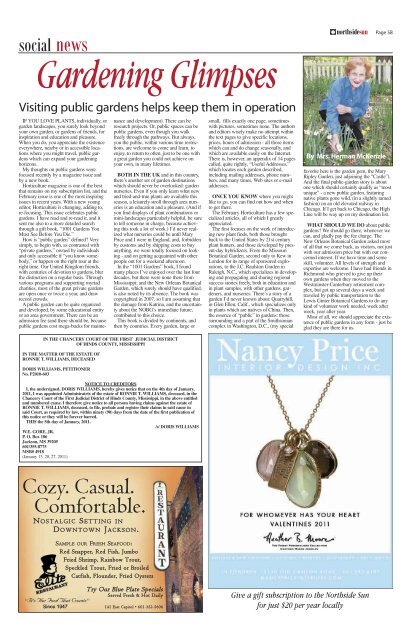TRIBUTE - Matchbin
TRIBUTE - Matchbin
TRIBUTE - Matchbin
Create successful ePaper yourself
Turn your PDF publications into a flip-book with our unique Google optimized e-Paper software.
social news<br />
Gardening Glimpses<br />
Visiting public gardens helps keep them in operation<br />
IF YOU LOVE PLANTS, individually, or<br />
garden landscapes, you surely look beyond<br />
your own garden, or gardens of friends, for<br />
inspiration and education and pleasure.<br />
When you do, you appreciate the existence<br />
everywhere, nearby or in accessible locations<br />
where you might travel, public gardens<br />
which can expand your gardening<br />
horizons.<br />
My thoughts on public gardens were<br />
focused recently by a magazine issue and<br />
by a new book.<br />
Horticulture magazine is one of the best<br />
that remains on my subscription list, and the<br />
February issue is one of the most inspiring<br />
issues in recent years. With a new young<br />
editor, Horticulture is changing, adding to,<br />
re-focusing. This issue celebrates public<br />
gardens. I have read and re-read it, and it<br />
sent me also to a more detailed search<br />
through a gift book, “1001 Gardens You<br />
Must See Before You Die.”<br />
How is “public garden” defined? Very<br />
simply, to begin with, as contrasted with<br />
“private gardens,” owned by individuals<br />
and only accessible if “you know somebody,”<br />
or happen on the right tour at the<br />
right time. Our United Kingdom friends,<br />
with centuries of devotion to gardens, blur<br />
the distinction on a regular basis. Through<br />
various programs and supporting myriad<br />
charities, most of the great private gardens<br />
are open once or twice a year, and draw<br />
record crowds.<br />
A public garden can be quite organized<br />
and developed, by some educational entity<br />
or an area government. There can be an<br />
admission fee (and there should be, because<br />
public gardens cost mega-bucks for mainte-<br />
nance and development). There can be<br />
research projects. Or, public spaces can be<br />
public gardens, even though you walk<br />
freely through the pathways. But always,<br />
you the public, within various time restrictions,<br />
are welcome to come and learn, to<br />
enjoy, to return to often, just to be one with<br />
a great garden you could not achieve on<br />
your own, in many lifetimes.<br />
BOTH IN THE UK and in this country,<br />
there’s another set of garden destinations<br />
which should never be overlooked: garden<br />
nurseries. Even if you only learn what new<br />
and tried-and-true plants are available this<br />
season, a leisurely stroll through area nurseries<br />
is an education and a pleasure. (And if<br />
you find displays of plant combinations or<br />
mini-landscapes particularly helpful, be sure<br />
to tell someone in charge, because achieving<br />
this took a lot of work.) I’d never realized<br />
what nurseries could be until Mary<br />
Price and I were in England, and, forbidden<br />
by customs and by shipping costs to buy<br />
anything, we were totally focused on looking<br />
- and on getting acquainted with other<br />
people out for a weekend afternoon.<br />
In the “1001 Gardens” book, I found<br />
many places I’ve enjoyed over the last four<br />
decades, but there were none there from<br />
Mississippi; and the New Orleans Botanical<br />
Garden, which surely should have qualified,<br />
is also noted by its absence. The book was<br />
copyrighted in 2007, so I am assuming that<br />
the damage from Katrina, and the uncertainty<br />
about the NOBG’s immediate future,<br />
contributed to this choice.<br />
This book is divided by continents, and<br />
then by countries. Every garden, large or<br />
IN THE CHANCERY COURT OF THE FIRST` JUDICIAL DISTRICT<br />
OF HINDS COUNTY, MISSISSIPPI<br />
IN THE MATTER OF THE ESTATE OF<br />
RONNIE T. WILLIAMS, DECEASED<br />
DORIS WILLIAMS, PETITIONER<br />
No. P2010-603<br />
NOTICE TO CREDITORS<br />
I, the undersigned, DORIS WILLIAMS, hereby gives notice that on the 4th day of January,<br />
2011, I was appointed Administratrix of the estate of RONNIE T. WILLIAMS, deceased, in the<br />
Chancery Court of the First Judicial District of Hinds County, Mississippi, in the above entitled<br />
and numbered cause. I therefore give notice to all persons having claims against the estate of<br />
RONNIE T. WILLIAMS, deceased, to file, probate and register their claims in said cause in<br />
said Court, as required by law, within ninety (90) days from the date of the first publication of<br />
this notice or they will be forever barred.<br />
THIS the 5th day of January, 2011.<br />
/s/ DORIS WILLIAMS<br />
W.E. GORE, JR.<br />
P. O. Box 186<br />
Jackson, MS 39205<br />
601/355-8775<br />
MSB# 4918<br />
(January 13, 20, 27, 2011)<br />
Cozy. Casual.<br />
Comfortable.<br />
N O S T A L G I C S E T T I N G IN<br />
D O W N T O W N J A C K S O N .<br />
SAMPLE OUR FRESH SEAFOOD:<br />
Red Snapper, Red Fish, Jumbo<br />
Fried Shrimp, Rainbow Trout,<br />
Speckled Trout, Fried or Broiled<br />
Catfish, Flounder, Fried Oysters<br />
Try OOur BBlue PPlate SSpecials<br />
Served Fresh & Hot Daily<br />
141 East Capitol • 601-352-5606<br />
small, fills exactly one page, sometimes<br />
with pictures, sometimes none. The authors<br />
and editors wisely make no attempt within<br />
the text pages to give specific locations,<br />
prices, hours of admission - all those items<br />
which can and do change seasonally, and<br />
which are available easily on the Internet.<br />
There is, however, an appendix of 14 pages<br />
called, quite rightly, “Useful Addresses,”<br />
which locates each garden described,<br />
including mailing addresses, phone numbers,<br />
and many times, Web sites or e-mail<br />
addresses.<br />
ONCE YOU KNOW where you might<br />
like to go, you can find out how and when<br />
to get there.<br />
The February Horticulture has a few specialized<br />
articles, all of which I greatly<br />
appreciated.<br />
The first focuses on the work of introducing<br />
new plant finds, both those brought<br />
back to the United States by 21st century<br />
plant hunters, and those developed by present-day<br />
hybridizers. From the Missouri<br />
Botanical Garden, second only to Kew in<br />
London for its range of sponsored explorations,<br />
to the J.C. Raulston Garden in<br />
Raleigh, N.C., which specializes in developing<br />
and propagating and sharing regional<br />
success stories freely, both in education and<br />
in plant samples, with other gardens, gardeners,<br />
and nurseries. There’s a story of a<br />
garden I’d never known about: Quarryhill,<br />
in Glen Ellen, Calif., which specializes only<br />
in plants which are natives of China. Then,<br />
the essence of “public” in gardens: those<br />
surrounding and a part of the Smithsonian<br />
complex in Washington, D.C., (my special<br />
Page 5B<br />
By Mrs. Herman McKenzie<br />
favorite here is the garden gem, the Mary<br />
Ripley Garden, just adjoining the “Castle”).<br />
And the final public-garden story is about<br />
one which should certainly qualify as “most<br />
unique” - a new public garden, featuring<br />
native plants gone wild, (in a slightly tamed<br />
fashion) on an old elevated railway in<br />
Chicago. If I get back to Chicago, the High<br />
Line will be way up on my destination list.<br />
WHAT SHOULD WE DO about public<br />
gardens? We should go there, whenever we<br />
can, and gladly pay the fee charge. The<br />
New Orleans Botanical Garden asked most<br />
of all that we come back, as visitors, not just<br />
with our admission price but with our concerned<br />
interest. If we have time and some<br />
skill, volunteer. All levels of strength and<br />
expertise are welcome. I have had friends in<br />
Richmond who grieved to give up their<br />
own gardens when they moved to the<br />
Westminster-Canterbury retirement complex,<br />
but got up several days a week and<br />
traveled by public transportation to the<br />
Lewis Ginter Botanical Gardens to do any<br />
kind of volunteer work needed, week after<br />
week, year after year.<br />
Most of all, we should appreciate the existence<br />
of public gardens in any form - just be<br />
glad they are there for us.<br />
Give a gift subscription to the Northside Sun<br />
for just $20 per year locally

















